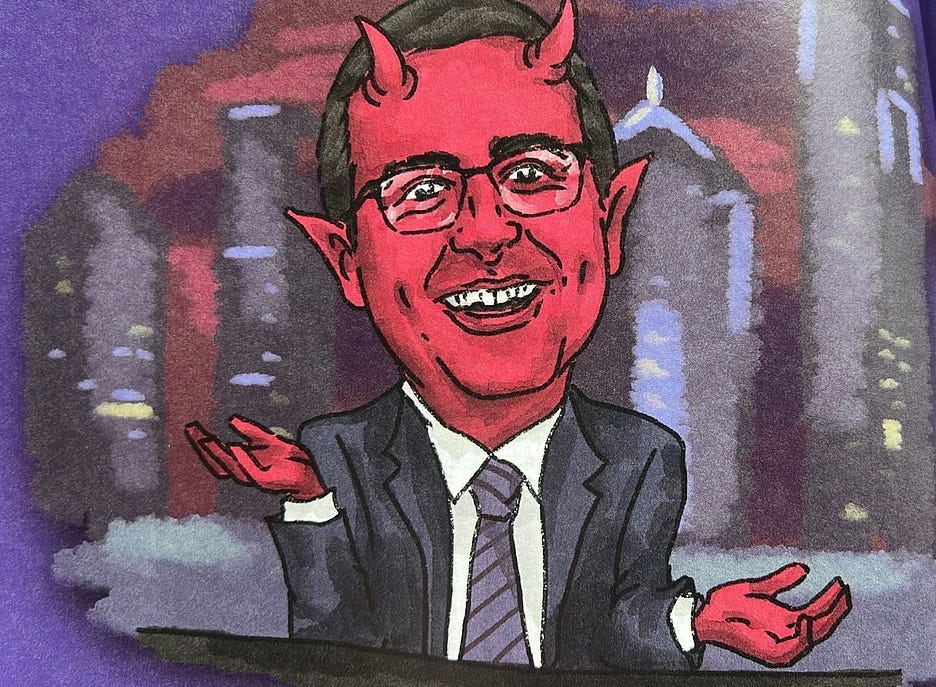“ISPs should not be able to engage in any sort of f*ckery that limits or manipulates the choices you make online.” — John Oliver
On Thursday, the FCC voted 3–2 to treat broadband as a public utility, much like water and electricity, aiming to regulate internet access more stringently.
This move reinstates the net neutrality rules first set under Obama in 2015 and repealed in 2017 during Trump’s presidency, by this, well, vacuous sell-out:
That’s former FCC Chairman Ajit Pai, who shortly before repealing net neutrality, decided to post this “satirical” video through the conservative news site, the Daily Caller.
It raised a few questions:
Why would a government employee advocate for a position exclusively through a biased media outlet?
Why would he dress up as Santa and propagate numerous near-lies in a video titled “7 things you can still do on the internet after net neutrality”?
Why would such a humorless greasy representative of big business have the false confidence to believe he could be funny in the first place?
Anyway, his FCC passed the laws, the fervor slowly died down, and we mostly haven’t heard about net neutrality in the news until today.
What’s the big deal about net neutrality?
Net neutrality acts like the internet’s fairness doctrine, ensuring everyone has equal access without preferential treatment.
Without it, consumers could face a slew of disadvantages.
ISPs could throttle (reduce the speed of) audio/video streaming services unless they—and then, you — pay more.
The ISPs could also prioritize access to certain news sites over others, skewing the information landscape and influencing public opinion.
Small businesses and startups could find themselves unable to compete with established giants because they can’t afford the “fast lane” fees.
ISPs could even block access to educational platforms that compete with their own services, putting valuable learning tools out of reach for many.
Essentially, no net neutrality meant the oligopoly of ISPs in America (Comcast, AT&T, etc), could pull every trick out of the Product Manager’s Handbook to find ways to make their stock price go up — and your bank account go down.
Most of these companies claimed innocence.
Of course, they cared about the consumer! Every giant business puts the needs of the client above their own. That’s just basic Capitalism 101.
A bunch of them even pledged not to let the new law affect their day-to-day business (even though they quietly advocated for just that).
Case in point:
I suppose that’s why only one day after net neutrality was repealed, the largest ISP in America, Comcast, removed its promise to not “prioritize internet traffic or create paid fast lanes”.
It’s probably why — ever so slowly — ISPs started introducing new ‘products’ to help their bottom line…I mean consumers.
There’s innovative services like ‘zero-rating’, where companies like AT&T charge $0 data fees for using specific services like DirectTV.
Sounds great on the surface!
Free data!
But then you find out AT&T owns DirectTV.
And then it slowly leaks out that almost all major ISPs in the US were throttling non-owned services — like Netflix, Youtube, etc.
Those media companies hate that.
So they make deals behind closed doors and quietly pay these ISPs to not throttle their traffic. And if they pay enough, some lucky users get their services for $0 of data too!
But then you have companies like Netflix paying boatloads of extra cash to companies to provide a service that you already received for no additional cost.
Well, until you look at it from another perspective:
The funny thing is?
I could’ve sworn in microeconomics class, that when you increase competition, the prices are supposed to go…down.
The end result of all this?
You, the average consumer, get screwed when it comes time to paying.
You get screwed with higher payments for your favorite video and audio streaming sites. You get screwed with slow speeds on non-fast-lane websites you visit. You get screwed with ever-increasing internet bills.
But you might not notice it for a while.
Because every few months or so, a crafty product manager is working on yet another way to increase the company’s bottom line while maintaining as many subscribers as possible.
I should know — I was the head of such a department at a large ISP in Asia.
The thing is, our company, at least for a while, was aiming to compete by providing a better service than the established competition.
Because when you have established competition (an oligopoly like most ISPs in America), you get entrenched customers.
And when customers are entrenched and find it hard to leave (the switching costs), the strings behind the puppet of your essential service become limitless.
And every string helps the company’s bottom line.
At the expense of you, the inflation-burned-out consumer.
But what happened to Nightmare Santa?
As for our old pal, lawyer Ajit Pai, I wouldn’t worry about him too much.
Before he was ever the head of the FCC, he worked at another one of America’s favorite companies, Verizon.
And true to the spirit of captured American capitalism, since leaving the government, he’s been gainfully employed making even more money for…a private equity firm that’s purchased several ISP-related companies since.
What a fun coincidence.
But as he said in response to the repeal of his regulation baby:
“This is a complete waste of time.”
If a big business cannot profit off a regulation, is it even worth the effort?
J.J. Pryor
If you’re a blogger or business struggling to get noticed, please feel free to reach out.







